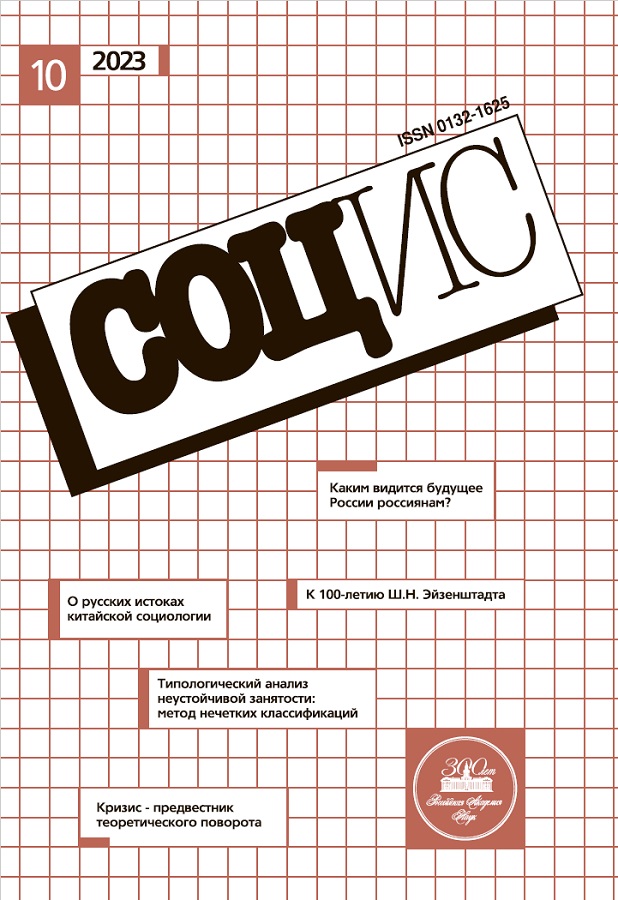Images of ”Russia of the Future“ in the Representations of Its Citizens
- Authors: Kolennikova N.D.1
-
Affiliations:
- Institute of Sociology of FCTAS RAS
- Issue: No 10 (2023)
- Pages: 91-103
- Section: Articles
- URL: https://clinpractice.ru/0132-1625/article/view/661949
- DOI: https://doi.org/10.31857/S013216250028307-0
- ID: 661949
Cite item
Abstract
The article analyzes the ideas of Russians about the short- and medium term future of Russia. Based on the data of a nationwide representative study conducted by the Institute of Sociology of the Federal Scientific Research Center of the Russian Academy of Sciences in June 2023, it is shown that anxious moods dominate among Russians in the short term. At the same time, stability - one of the most valuable benefits for the population from the current social contract – is not expected by them. Regarding to the desired future in the Russian public consciousness, the coexistence of four popular images is noted: “The state of equality and justice”, “The state of traditional values”, “Nation state” and “Free Market State”. The first three of them consolidate the population in the position of Russia's independent development, and the last image, while losing support among the mass strata, unites supporters of Russia's Western vector of development. At the same time. The first three scenarios contain the principle of social justice as a key component interpreted among the population in different ways. Four models of the future based on different notions of justice are demonstrated: “Request for equal opportunities”, “Request for reduction of income inequality”, “Request for the same standard of living” and “Request for reduction of territorial inequalities”. The greatest consolidation potential is characteristic for a group oriented towards the future of the country with strong power, the preservation of national traditions, and an original vector of the country's development, although the values of social justice are also important for it.
About the authors
Nina D. Kolennikova
Institute of Sociology of FCTAS RAS
ORCID iD: 0000-0001-9458-8762
Russian Federation, Moscow
References
- Андреев А.Л., Андреев И.А., Слободенюк Е.Д. Представления россиян о будущем России // Социологические исследования. 2022. № 10. С. 49–61.
- Бауман З. Свобода / Пер. с англ. Г.М. Дашевского, предисл. Ю.А. Левады. М.: Новое изд-во, 2006.
- Бестужев-Лада И.В. Глобальный технологический прогноз на XXI век // Социологические исследования. 2007. № 4. С. 1–21.
- Горшков М.К. К вопросу о социологии массовидных духовных образований (теоретико-методологический аспект) // Социологические исследования. 2021. № 2. С. 3–14.
- Динабург С.Р. Современные исследования будущего: между утопией и форсайтом // Вестник ПНИПУ. Культура. История. Философия. Право. 2016. № 3. С. 86–97.
- Желтикова И.В. Образ будущего. Орел: Картуш, 2021.
- Замятин Д.Н. Образ страны: структура и динамика // Общественные науки и современность. 2000. № 1. С. 107–115.
- Измоденова Н.Н. Образ будущего России: социальное воображаемое // Труды Кольского научного центра РАН. 2018. Т. 9. № 7–14. С. 96–101.
- Нестик Т.А. Коллективный образ будущего: социально-психологические аспекты прогнозирования // Вопросы психологии. 2014. № 1. С. 3–13.
- Петренко В.Ф., Митина О.В. Психосемантическая методика «образ страны» и ее использование для анализа восприятия стран мира // Перспективы психологической науки и практики: сборник статей Международной научно-практической конференции / Под ред. В.С. Белгородского и др. M.: РГУ им. А.Н. Косыгина, 2017. С. 326–331.
- Российское общество и вызовы времени. Кн. 6 / Под ред. М.К. Горшкова, Н.Е. Тихоновой. М.: Весь Мир, 2022.
- Сушко П.Е. Представления россиян о возможных путях развития России: распространенность и специфика // Социологические исследования. 2022. № 11. С. 25–37.
- Шестопал Е.Б., Смулькина Н.В., Морозикова И.В. Сравнительный анализ образов своей страны у жителей российских регионов // Сравнительная политика. 2019. Vol. 10. No. 3. С. 74–94.
- Aalders W.J. Toekomstbeelden van vijf eeuwen. Groningen: J.B. Wolters, 1939.
- Berger P.L., Luckmann T. The Social Construction of Reality: A Treatise in the Sociology of Knowledge, Garden City. N.Y.: Anchor Books, 1966.
- Merton R.K. Social Theory and Social Structure. N.Y.: The Free Press, 1968.
- Schweizer K., Rauch W. An Investigation of the Structure of the Social Optimism Scale with Respect to the Dimensionality Problem // Journal of Individual Differences. 2008. Vol. 29. No. 4. P. 223–230.
- Thomas W.I., Thomas D.S. The Child in America: Behavior Problems and Programs. Michigan: Johnson Reprint, 1928.
Supplementary files










